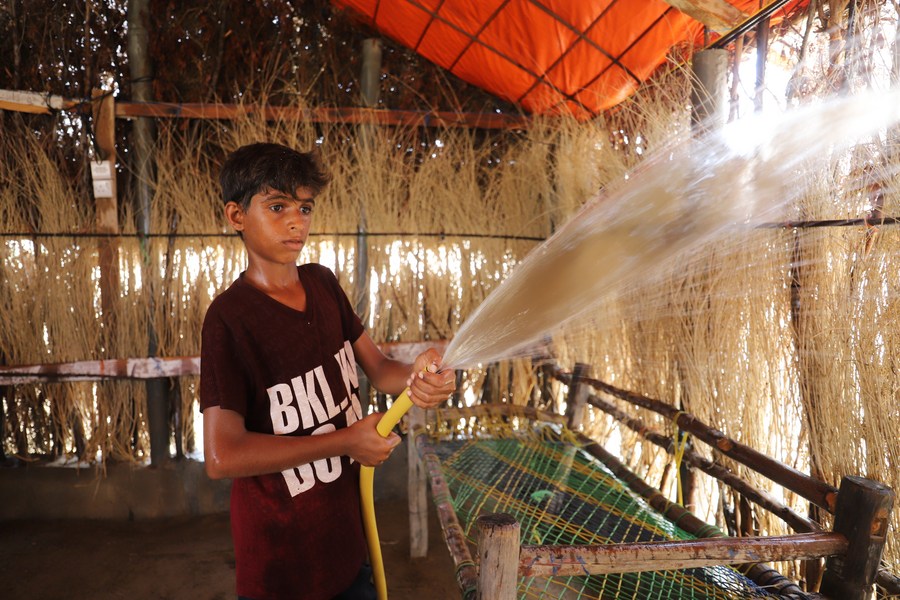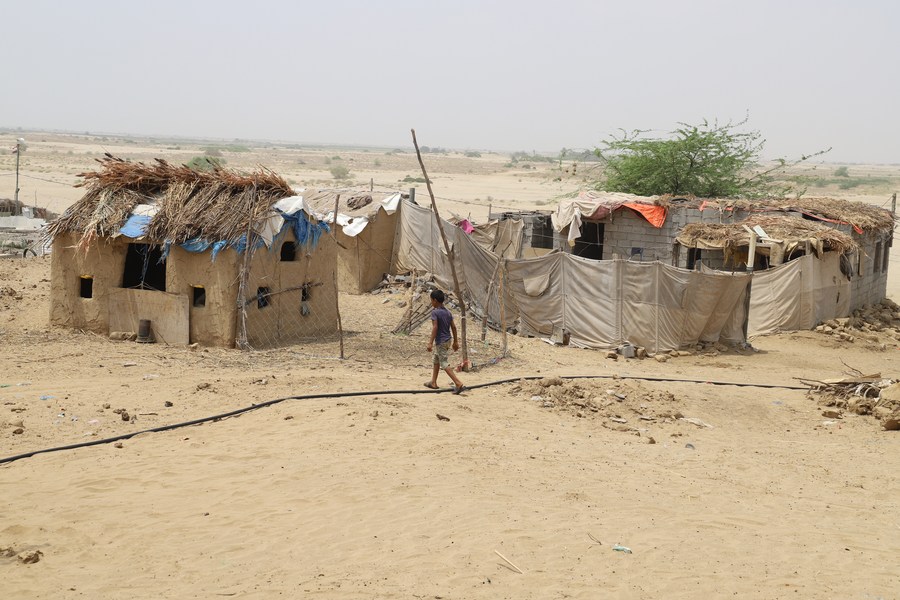
A child uses water to cool down his family's hut inside a camp for internally displaced persons in Midi District, Hajjah Province, northern Yemen on June 17, 2021. (Xinhua/Mohammed Al-Wafi)
The summer heat is exacerbating the suffering of internally displaced Yemenis amid a lack of access to electricity and clean water.
HAJJAH, Yemen, June 18 (Xinhua) -- With the summer temperatures soaring in the war-torn Yemen, thousands of internally displaced families are struggling to survive.
The heatwaves this summer have exacerbated the suffering of the displaced elderly and children amid a lack of access to electricity and water supplies due to the ongoing civil war.
Mohammad al-Faedi, 72, lies on bed in his hut in the Bani Fayed camp, a makeshift camp that houses some 1,200 displaced families in the government-controlled Midi district of the northern Hajjah Province.
The temperature of over 40 degrees Celsius has worsened his health.
His son Abdo stands helplessly. Nothing cools the hut; even the wind that comes in through the window is hot.
"The battles are around us and there is no way out of here," Abdo told Xinhua.
"We have suffered greatly from a lack of clean water, and there is no electricity supply to run a fan to cool the air. There is also no medical or humanitarian aid provided in this camp," he said.
"Our condition is horrific, and the heat is making things worse," he added.
Al-Faedi escaped with his 13-member family from the neighboring district of Harad to this camp in early 2015 after the civil war erupted.

An old man is seen inside of her family's tent at a camp for internally displaced persons in Midi District, Hajjah Province, northern Yemen on June 17, 2021. (Xinhua/Mohammed Al-Wafi)
Many elderly and children in this arid region suffer from dehydration or heat stroke.
In another hut, 62-year-old Fatima Ahmed Jarbhi complains of the stifling summer heat and diseases.
"Our lives are unstable. Since the beginning of the war, we have been in constant displacement. We live on one meal a day," Jarbhi told Xinhua.
"Our children do not get enough food, their clothes are worn out and do not protect them from the sun," the grandmother lamented. "This heatwave has damaged our children's skin."
Another displaced man, Hassan Musbeh, said, "Most children, women and elders fall sick amid the soaring summer temperatures."
Najeeb al-Sadi, head of the management of the displacement camps in the government-controlled areas, said the wave of displacement is continuing.
"The number of internally displaced persons across Yemen has reached 4,100,000 and are living in 1,220 camps across the country," al-Sadi told Xinhua, adding that "the battles in frontlines have hampered the work of many humanitarian aid agencies."
Abdul-Baqi Shamsan, professor of political sociology at Sanaa University, suggests using the humanitarian file as a pressure card on the warring Yemeni parties to end the civil war.
"All parties must be pressured to take responsibility for Yemenis' suffering. They should move toward a comprehensive cease-fire agreement as well as enter into political talks to end the war and the suffering of the Yemeni people," he told Xinhua.

A child walks inside a camp for internally displaced persons in Midi District, Hajjah Province, northern Yemen on June 17, 2021. (Xinhua/Mohammed Al-Wafi)
Yemen has been mired in civil war since late 2014 when the Houthi militia seized control of several northern provinces and forced the internationally recognized government of President Abd-Rabbu Mansour Hadi out of the capital Sanaa.
The war has killed tens of thousands of people, displaced 4 million, pushed the country to the brink of famine and caused what the United Nations describes as the worst humanitarian crisis in the world.
A high-level Omani delegation visited Sanaa last week as part of the international peace efforts to try to convince the Houthi group to accept a recent UN-proposed cease-fire agreement.
The civil war has entered its seventh year with no end in sight yet. ■




